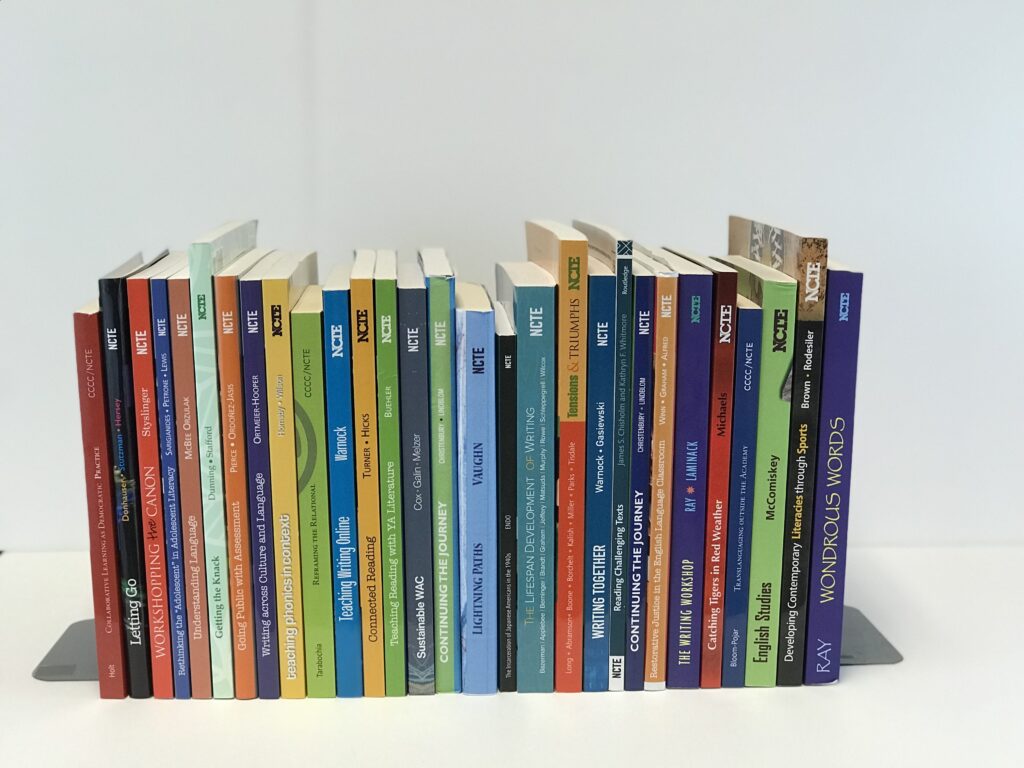The National Day on Writing® celebrates writing—and the many places, reasons, and ways we write each day—as an essential component of literacy. Since 2009, #WhyIWrite has encouraged thousands of people to lift their voices to the things that matter most to them. Check out the titles from NCTE to support you in the teaching of writing.
Continuing the Journey 2: Becoming a Better Teacher of Authentic Writing focuses on authentic writing instruction for the high school classroom. Ken Lindblom and Leila Christenbury draw on what research has taught them about writing—concepts deeply rooted in personal identity and real-world experience—and why we must teach writing accurately, effectively, and fearlessly.
In Designing Writing Assignments Traci Gardner offers practical tips, starting points, and a companion website to help secondary and college teachers design effective writing assignments.
Genre Theory: Teaching, Writing, and Being synthesizes theory and research about genres and provides secondary-level teachers with practical classroom applications.
Learning to Write for Readers: Using Brain-Based Strategies
This brain-based approach to writing instruction will help you build from the tremendous storehouse of knowledge students already possess about language to help them learn what they need to know about writing.
Lesson Plans for Teaching Writing is a collection of lesson plans, grouped around popular categories such as Writing Process, Portfolios, and Writing on Demand, will help prepare high school and college students for college-level writing.
The Lifespan Development of Writing presents the results of a four-year project to synthesize the research on writing development at different ages from multiple, cross-disciplinary perspectives, including psychological, linguistic, sociocultural, and curricular.
Mobile Technologies and the Writing Classroom: Resources for Teachers explores both writing for and about mobile technologies and writing with mobile technologies.
Nonfiction Writers Dig Deep: 50 Award-Winning Children’s Book Authors Share the Secret of Engaging Writing offers a wide range of tips, tools, teaching strategies, and activity ideas to help students learn to craft rich, unique prose.
A Place to Write: Getting Your Students out of the Classroom and into the World explores opportunities for writing in a different real-world setting such as museums, public places, and natural places by providing a range of practical classroom activities in a variety of commonly taught genres.
Reader Response Notebook, The: Teaching toward Agency, Autonomy, and Accountability demonstrates how students’ creative responses lead to deep comprehension of diverse texts and ultimately help them to develop their literate identities.
Speak for Yourself: Writing with Voice shows how to focus on voice in the teaching of writing to help students take ownership of their work, enjoy what they’re writing, and produce writing that shows depth of thought and originality of expression.
Strategic Writing: The Writing Process and Beyond in the Secondary English Classroom, Second Edition refines, reorganizes, and updates the material to better support classroom teachers dedicated to teaching not just the process of writing but also the strategies that help students learn to write effectively throughout their lives.
Sustainable WAC: A Whole Systems Approach to Launching and Developing Writing Across the Curriculum Programs introduces a theoretical framework for WAC program development that takes into account the diverse contexts of today’s institutions of higher education, aids WAC program directors in thinking strategically as they develop programs, and integrates a focus on program sustainability.
Teaching Writing Online: How and Why provide the ideas and structure you need whether you are new to teaching writing online or are looking for a more comprehensive approach.
What Is “College-Level” Writing? Volume 2: Assignments, Readings, and Student Writing Samples highlights the practical aspects of teaching writing.
What Works in Writing Instruction: Research and Practice, Second Edition looks closely at instructional practices supported by a broad range of research and weaves them together into accessible recommendations that can inspire teachers to find what works for their own classrooms and students.
Wondrous Words: Writers and Writing in the Elementary Classroom explains in practical terms the theoretical underpinnings of how elementary and middle school students learn to write from their reading.
Writing about Literature, 2nd ed. is intended to help middle and secondary school English language arts teachers integrate literature study and composition instruction.
Writing Together: Ten Weeks Teaching and Studenting in an Online Writing Course narrates the experience of an asynchronous OWC through the dual perspective of the teacher, Scott Warnock, and a student, Diana Gasiewski, who participated in that OWC. Both teacher and student describe their strategies, activities, approaches, thoughts, and responses as they move week by week through the experience of teaching and taking an OWC.
Writing Workshop, The: Working through the Hard Parts (And They’re All Hard Parts) is a practical, comprehensive, and illuminating guide for both new and experienced teachers that confronts the challenges of the writing workshop head-on.
Stay tuned for additional books on writing from NCTE!

